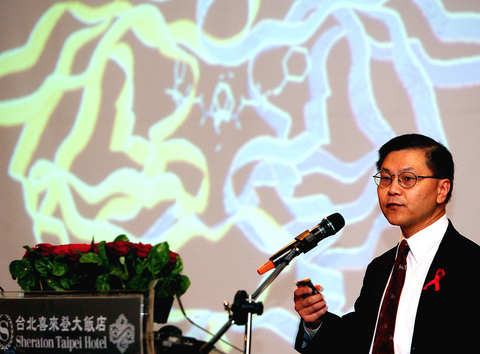Staff Reporter
The country needs to embrace the burgeoning field of bio technology in the way it embraced information technology, said David Ho(
Speaking at a celebration of 10 years of Highly Active Anti-Retroviral Therapy (HAART) use in Taiwan, Ho told the audience that Taiwan has what it takes to be an "innovation-based society" but needs to focus on encouraging development and stemming brain-drain.

PHOTO: WANG YI-SUNG, TAIPEI TIMES
Taiwan introduced HAART or "cocktail" treatment in 1997 after hard lobbying by then Department of Health head Chang Po-ya (
Before the new treatment arrived, being diagnosed as HIV positive was considered a death sentence, said Wu Shiow-ing (
"We used to hear about patients killing themselves after learning that they had HIV," Wu said. "Such incidents are much rarer since cocktail treatment was introduced because people now have hope."
Some of the patients who received the first batch of pills that department employees worked overtime to divvy up and send to hospitals are still alive, she added.
Ho, a Taiwanese-American, was chosen as Time magazine's man of the year in 1996. He now conducts research in the US and Taiwan.
"Taiwan must do more to develop industries of the future," Ho said. "So far, Taiwan has done a fabulous job developing its IT sector, but so far it seems to have missed out on biotech."
"There is no doubt in my mind that Taiwan has the capability to do the kind of clinical trials [required for further research into HIV]," said Ho, citing Taiwan's "remarkable" work with hepatitis B in support of his statement.
Ho is currently working on vaccines for HIV and several influenza viruses.
"We have entered stage two trials for our HIV vaccines," he said. "Tests show that with three doses of the vaccine, 90 percent of participants display a response."
However, whether or not the immune system response means that the participants have developed protection against HIV is still unknown, said Ho.
"The vaccine will not be ready in the near future," said Ho.
Ho said that Taiwan's isolation from the international health community makes internal biomedical development even more important.
"Of course, it is very harmful that Taiwan is not a part of the WHO," he said. "We are denied access to a lot of information. We have to make up for that by being more independent."
"Ultimately, however, the WHO does not hold the solution to the problems of the world," Ho said. "That is up to research done in individual countries."
The non-profit Taiwan AIDS Foundation, however, yesterday criticized the government, claiming that the number of people contracting AIDS in Taiwan has not decreased despite use of Ho's therapy treatment.
Foundation Chairman Twu Shiing-jer (涂醒哲), a former minister of health, said at a separate news conference that the foundation had found that the government was implementing a "biased" anti-AIDS policy -- concentrating most resources in medical treatment and checks.
Twu blamed the situation on the fact that some people wrongly believed that the cocktail therapy can cure the disease after it proved successful in prolonging the lives of AIDS patients.
Shi said the therapy allows AIDS patients to lead a normal life by reducing the HIV virus load in their bodies. However, with more and more AIDS patients needing the treatment, the department has been forced to spend more money on providing the cocktail and conducting medical examinations.
Additional reporting by CNA

An essay competition jointly organized by a local writing society and a publisher affiliated with the Chinese Communist Party (CCP) might have contravened the Act Governing Relations Between the People of the Taiwan Area and the Mainland Area (臺灣地區與大陸地區人民關係條例), the Mainland Affairs Council (MAC) said on Thursday. “In this case, the partner organization is clearly an agency under the CCP’s Fujian Provincial Committee,” MAC Deputy Minister and spokesperson Liang Wen-chieh (梁文傑) said at a news briefing in Taipei. “It also involves bringing Taiwanese students to China with all-expenses-paid arrangements to attend award ceremonies and camps,” Liang said. Those two “characteristics” are typically sufficient

A magnitude 5.9 earthquake that struck about 33km off the coast of Hualien City was the "main shock" in a series of quakes in the area, with aftershocks expected over the next three days, the Central Weather Administration (CWA) said yesterday. Prior to the magnitude 5.9 quake shaking most of Taiwan at 6:53pm yesterday, six other earthquakes stronger than a magnitude of 4, starting with a magnitude 5.5 quake at 6:09pm, occurred in the area. CWA Seismological Center Director Wu Chien-fu (吳健富) confirmed that the quakes were all part of the same series and that the magnitude 5.5 temblor was

The brilliant blue waters, thick foliage and bucolic atmosphere on this seemingly idyllic archipelago deep in the Pacific Ocean belie the key role it now plays in a titanic geopolitical struggle. Palau is again on the front line as China, and the US and its allies prepare their forces in an intensifying contest for control over the Asia-Pacific region. The democratic nation of just 17,000 people hosts US-controlled airstrips and soon-to-be-completed radar installations that the US military describes as “critical” to monitoring vast swathes of water and airspace. It is also a key piece of the second island chain, a string of

The Central Weather Administration has issued a heat alert for southeastern Taiwan, warning of temperatures as high as 36°C today, while alerting some coastal areas of strong winds later in the day. Kaohsiung’s Neimen District (內門) and Pingtung County’s Neipu Township (內埔) are under an orange heat alert, which warns of temperatures as high as 36°C for three consecutive days, the CWA said, citing southwest winds. The heat would also extend to Tainan’s Nansi (楠西) and Yujing (玉井) districts, as well as Pingtung’s Gaoshu (高樹), Yanpu (鹽埔) and Majia (瑪家) townships, it said, forecasting highs of up to 36°C in those areas